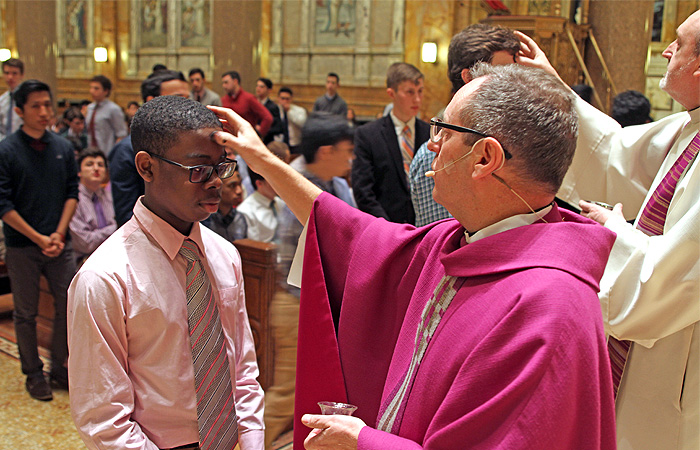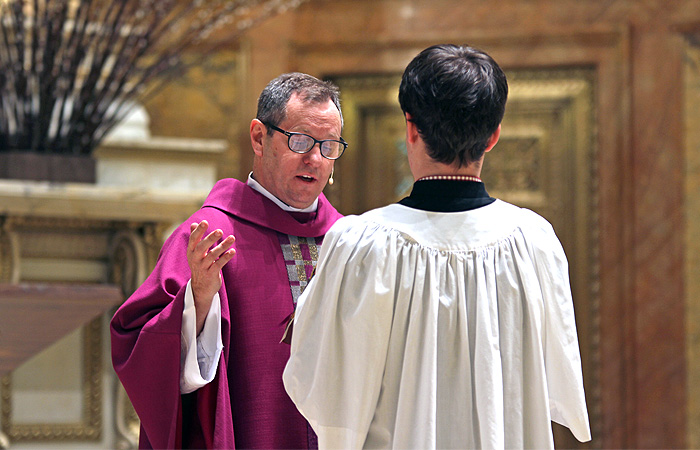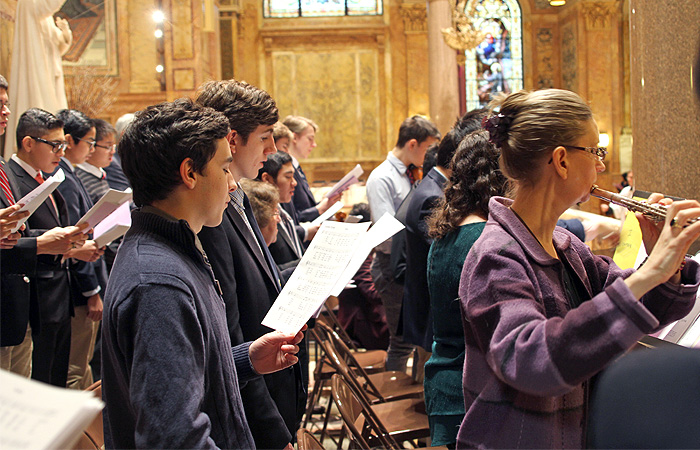Regis Community Gathers to Celebrate Mass on Ash Wednesday
On Wednesday, February 10, the Regis High School community gathered at the Church of Saint Ignatius Loyola to celebrate Ash Wednesday and the beginning of Lent. Below is a reprint of Mark Lane, C.O.'s homily delivered at the Mass.
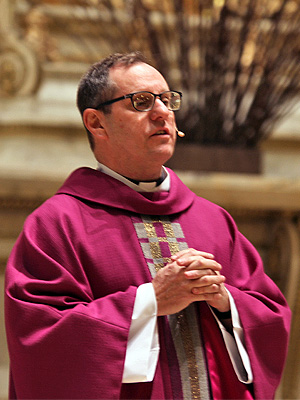 Ke ekiro kaApa, ka lo a Lokoku ka lo e Etan alo Ebusean. Amen. Ekapalon toyei ni kus...
Ke ekiro kaApa, ka lo a Lokoku ka lo e Etan alo Ebusean. Amen. Ekapalon toyei ni kus...
These are the opening words of the Mass in Turkana (Kenya).
I first went to Turkana in 1991, and have been a number of times since. The longest period was in 2000 when I spent nearly 3 months there.
Those 3 months I would count as among the most difficult of my life. I was for most of the time the only Musungu in the village. I had very little contact with the outside world in which I was familiar and instead was immersed in a culture and among a people that constantly challenged my presumptions.
As a result, I believe it was probably the most fruitful period of my life as well.
I learned so much. And it has proven to be a mother lode for stories. Let me tell you one.
Each Sunday I would say mass in the local church. The church was always packed, so the little children were pushed to the front to sit on the floor before the altar, at my feet.
I used to look at those little kids and wonder what their future held. They were smart, bright, and as deserving as any kid born anywhere in the world. But I knew the odds were stacked against them. The circumstances into which they were unwittingly born presented a quagmire of obstacles few would overcome.
There was one little girl who held my attention.
I began to call her Bette Midler—perhaps today you might call her Lady Gaga or Pink?
She was different from her peers. She was the only rotund kid; all the others were distinctively slender. Unlike all the other kids she had a very distinctive orange ting to her hair. She wore a shockingly pink frilly dress. Like many kids, she wore the same thing all the time because it was probably her only garment. The “Pepto Bismol” dress against her ebony skin made her stand out.
She was constantly moving when most of the kids were as still and silent as their stoic looking parents. I interpreted that as a sign of her energetic nature.
In my mind I began to write a Hollywood script for her life.
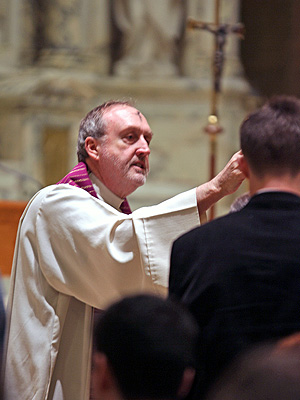 One Sunday after mass I was walking with the parish catechist and asked what the little girl’s real name was. I asked because—among the Turkana—knowing someone’s name can tell you much about the person. The Turkana name their children after where the child was born.
One Sunday after mass I was walking with the parish catechist and asked what the little girl’s real name was. I asked because—among the Turkana—knowing someone’s name can tell you much about the person. The Turkana name their children after where the child was born.
The most common tree in Turkana is the Ewoi tree, a version of the thorny acacia tree with the flat top so distinctive to the African Savanna. If a boy is born, as they often are, under the Ewoi tree his name will be Ewoi, if it is a girl her name will be Awoi.
If a child is born under the Esakon tree the boy will be called Esakon and a girl Asakon, and so on.
So I asked for Bette Midler’s real name. “Her name, Father, is Avideo.” “Avideo?” “Yes, Avideo.”
“That sounds like the English word, ‘video’.”
“Yes, Father, she was born in the parish hall one Friday evening when we were showing a video to the village.”
“Why is she a little rotund when all the other kids are skinny? Why does she have orange hair?”
I found out she was not fat but had a distended stomach and her hair was discolored because she was severely malnourished. She was born in the unlikely place of the video hall because her mother had many problems and has died. No one seemed to know the whereabouts of her father.
This was proving to be anything but a glamorous Hollywood story. This 5 year girl was surviving by wandering around from hut to hut trying to find something to eat; being taken care of as best they could by people themselves struggling to survive. Imagine this: a 5 year old wandering around looking for food and a place to sleep… and what of the love every child craves and deserves?
That little girl made me ask myself, “What does it mean to be a priest saying mass? What does it mean for you and me to go to mass? What difference does it make?”
What should I do? Pat her on the head and wish her well? Tell myself I will say a few prayers for her?
I knew I would get back on a plane and go home. And with time I would soon forget her.
But what does this Eucharist that we celebrate demand of me? Do we not believe that this is the body of Christ? Taken, broken, given for us?
Surely to celebrate the Eucharist means that we go out from here to give ourselves in some way too. No? Surely to celebrate this Eucharist calls me to be food for others; calls me to be food for Avideo and all our children, our sisters and brothers, who hunger.
I came back and a group of us started an organization where today we have built over $1 million worth of dams and wells and farming and community resources and programs.
We recently started a school for boys I am calling the Regis of Turkana. There was already a well-funded girls school so we started one for boys.
The 2 years before coming to Regis I spent working for an organization called Unbound which sponsors children around the world. I still go when I can to preach for them and ask others to be sponsors. The sponsorship is just enough to give the families a leg-up out of the morass of poverty. I sponsor 3 kids myself.
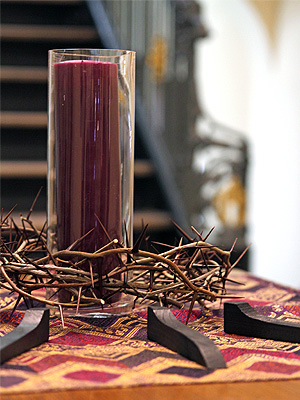 In a few minutes we will bless the ashes we made yesterday in our courtyard.
In a few minutes we will bless the ashes we made yesterday in our courtyard.
I ask you to consider what marking our forehead means.
If it is to be more than a quaint symbol with little value it must mark an intention to change; it must be a sign that we intend through these 40 days of Lent to reorient our lives towards good, to reposition our hearts towards compassion, to reaffirm a willingness to engage and feed others. To do something as real, and practical, and giving as caring for the Avideos of this world.
Not with pats on the head and token prayers said from a safe distance but with the risk of giving of myself.
The Gospel today is very clear. We are to do something real and practical. It does not say IF you prayer but WHEN. Not IF you fast or IF you give alms, but WHEN you give up some resource of your own—be it food or time or space on the train or in a conversation; WHEN you give alms—some of your own money or good for the good of others.
I implore you to consider doing something this Lent. Do not let it pass like any other time distracted by the business of life and school and your own agenda. But make a deliberate choice, maybe even before you leave mass today, to do something real this Lent.
In the lobby of the school we placed a crown of thorns and three nails, each in imitation of Jesus’ own passion. And in the midst is a candle. I am hoping that this symbol proves to be a timely reminder to each and all of us to follow the path of Christ through death to life. That through the discipline and generosity of Lent a new light will be born in each of us this coming Easter.
Do something real. Be it as prosaic as giving up donuts or cookies; be it taking on extra prayer or exercise; be as routine but effective as not arguing with your folks when they ask you to do something, or doing it before you are asked, or giving them space in the conversation… Find some way not to ignore the need at your feet: resist just patting the problem on the head and wishing it well, then walking away and forgetting about it. No, let this lent be the time I turn around and try to engage for the better the issues right in front of me.
Ke ekiro kaApa, ka lo a Lokoku ka lo e Etan alo Ebusean. Amen.
Read more Regis news
